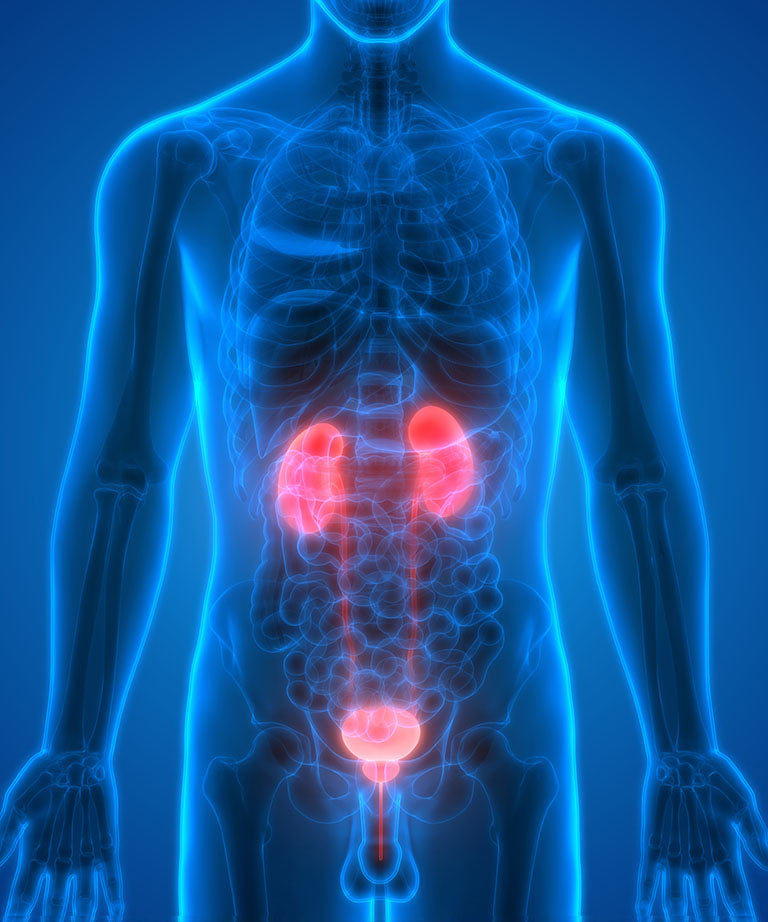Renal Cancer
Kidneys are two reddish-brown bean-shaped organs about the size of a fist located at the posterior side on either side of the spine, just below the ribcage. Their function is to filter blood to remove impurities, excess minerals and salts and extra water. Kidneys also produce hormones that control blood pressure and affect red blood cell production.
Renal cancer or kidney cancer originates from cells lining the proximal tubules of the kidney. Kidneys are made up of numerous nephrons, which are the microscopic structural and functional units of the kidneys.
The proximal tubule is a part of these nephrons which plays a vital role in kidney functions like absorption of glucose, amino acids and other solutes from blood and ultimately helps in the formation of urine that removes toxins from our body.
Symptoms of Renal Cancer:
Symptoms of renal cancer include:
Although most people have two functioning kidneys, both function independently of each other. Thus, if one kidney has become dysfunctional or has been removed (for any reason), that person can still survive with a single normal functioning kidney.
Types of Renal Cancer
The various types of renal cancers are:

Diagnostics Facilities
Advanced Cancer Diagnostics
Advanced Cancer Treatment
General Diagnostic Facilities
Causes of Renal cancer
Various risk factors that can increase the chances of kidneys being affected by renal cancer are:
- Smoking: Smoking has been shown to increase the risk of renal cancer. Extensive studies have shown about 38 to 40% increased risk of renal cancer in current and formal smokers.
- Obesity: Obese individuals are more at risk of developing renal cancer.
- Hypertension: Hypertensive individuals are at an increased risk of contracting renal cancer.
- Prolonged use of pain medications: Prolonged use of medications to reduce pain (analgesics), can also increase an individual’s risk of contracting renal cancer.
- Long-term dialysis: Need for long-term dialysis in patients with chronic renal failure, has also been revealed to increase the risk of contracting renal cancer.
- Genetic conditions: Inherited syndromes like von Hippel-Lindau disease, Birt-Hogg-Dube syndrome, Tuberous sclerosis complex, Hereditary papillary renal cell carcinoma or Familial renal cancer increases an individual’s risk of acquiring renal cancer.
- Family history: A positive family history of renal cancer in first-degree relatives, has been associated with an increased risk of acquiring renal cancer.
When to see the doctor?
The symptoms can appear in different forms as mentioned above and hence, if you are experiencing a combination of any of these symptoms, especially over longer periods, you should consult a doctor.

Prevention of Renal Cancer
Preventive measures to reduce the risk of contracting renal cancer are:
Tests for Renal Cancer
After consultation with the specialist, the following tests may be carried out:
- A physical exam: A thorough physical examination will be carried out, after taking a detailed history of your symptoms
- Ultrasound: An abdominal ultrasound is usually the first test done to see if any suspicious renal masses are present.
- CT scan: A CT scan of the chest, abdomen and pelvis is done to determine the stage of disease; which in turn will help decide the best treatment sequence for a given patient.
- MRI scan: An MRI scan may sometimes be asked for, especially in early cases of suspicious renal masses.
- PET CECT scan: A PET CT scan may be suggested in advanced or recurrent cases to rule out the spread of cancer to other sites, eg lungs, liver, bone, etc.
- Image-guided biopsy: In patients with metastatic renal cancer, an ultrasound or CT scan may be used as a guide to performing biopsy from the renal mass, to confirm the histopathological type and to determine further treatments. In patients with enlarged lymph nodes in the neck (due to the spread of renal cancer), a neck lymph node biopsy may be performed instead, for the same purpose.
- Urine cytology: A urine cytology is usually performed in cases of transitional cell carcinoma of the kidneys to assess the entire urinary tract to rule out synchronous tumours in other parts of the urinary tract like the urinary bladder or ureters.


Treatment for Renal Cancer
The treatment for renal cancer depends upon cancer staging, the patient’s health and medical conditions, nutritional status etc.
The different treatment strategies include:
Surgery:
- Radical Nephrectomy: In large tumours involving most of the kidney or central part of the kidney, radical nephrectomy is performed. This procedure involves the removal of the entire kidney along with the surrounding fatty tissue and most often the ipsilateral adrenal gland. A radical lymph nodal dissection is usually performed simultaneously to remove all the draining lymph nodes in the surrounding region.
- Partial Nephrectomy or Nephron sparing surgery: A partial nephrectomy takes preference in patients with smaller tumours, usually located towards the upper or lower parts of the kidney. The objective is to remove the entire tumour with the diseased tissues while preserving the healthy tissues of the kidney.
- Cytoreductive Nephrectomy: A nephrectomy is usually not performed in patients with stage IV renal cancer but is necessitated in unique conditions wherein the patient is diagnosed with stage IV (metastatic) renal cancer, wherein the renal tumour is forming the main tumour bulk or the patient is experiencing significant pain and persistent hematuria, not improving with conventional treatments.
Targeted therapy:
This therapy uses drugs to target specific proteins within the cancer cells to kill them. Targeted therapy drugs used in renal cancer include; tyrosine kinase inhibitors like Sunitinib, Sorafenib, Pazopanib, Cabozantinib, Lenvatinib or VEGF protein inhibitors like Bevacizumab.
Targeted therapy is recommended in metastatic renal cancer, in patients with locally advanced renal cancer as neoadjuvant treatment (to reduce tumour size prior to surgery) or in patients after surgery as adjuvant treatment.
Immunotherapy:
Biological therapy or immunotherapy is exercised in advanced cases. Immunotherapy targets cells that affect the body’s immune response and helps the body eliminate cancer cells.
Radiation therapy:
Radiation therapy is recommended in patients with stage IV renal cancer to treat painful bony metastasis.
Doctors

Dr. Shreedhar G K

Dr. Saravana Rajamanickam

Dr. Karthick Rajamanickam

Dr. N. Kathiresan



